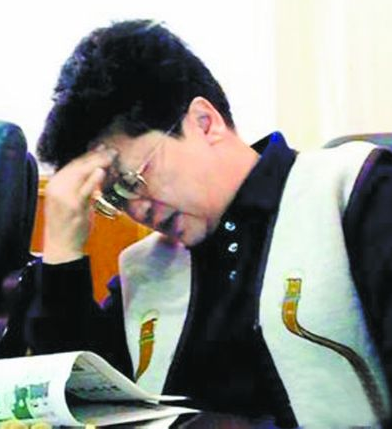

 |
| Yang Xiuzhu. (File Photo) |
NEW YORK/BEIJING, June 10 -- The first hearing in the trial of China's most wanted economic fugitive Yang Xiuzhu took place in a New York immigration court on Tuesday.
The 30-minute hearing was held behind closed doors, but the former Chinese official could be seen sitting in the courtroom in an orange prison jumpsuit.
Yang's lawyer Vlad Kuzmin said she has applied for political asylum, but refused to reveal any other details.
After the hearing, Yang was taken back to the correctional facility in Hudson County, New Jersey.
Last month, a source of U.S. Immigration and Customs Enforcement (ICE) confirmed that Yang, who went into hiding after being sought after by anti-corruption investigators in China, has been detained in the United States.
The ICE accused Yang of "violating the terms of the Visa Waiver Program," and asked the immigration court to deport her to China.
"Xiuzhu Yang is in U.S. Immigration and Customs Enforcement custody pending removal to China, for violating the terms of the Visa Waiver Program. As a foreign law enforcement fugitive, Yang is an ICE enforcement priority," Lou Martinez, spokesman of the ICE New York Field Office, has said in an statement.
Yang is one of the 100 Chinese nationals suspected of corruption who are believed to have fled abroad. She used to serve as vice mayor of Wenzhou, a coastal city in the eastern Zhejiang Province. When investigators started looking into her activities in 2003, she and her family fled China.
Investigators have found evidence that Yang had accepted 253 million yuan (about 41 million U.S. dollars at current price) in bribes. She was subject to an Interpol red notice.
China has released a list of 100 economic fugitives, all believed to have fled abroad, as part of the country's recent anti-corruption campaign.
All of the fugitives are subject to worldwide Interpol arrest warrants.
The 77 men and 23 women on Interpol's red notice list are primarily former government functionaries whose cases involve very substantial amounts of money.
The latest phase of the campaign to repatriate corruption suspects, codenamed Sky Net, was launched in March.
China is currently enjoying increased willingness from other countries to help. Over the past few years, China has worked hard to break down barriers to extradition and judicial cooperation.
Law enforcement cooperation with the United States, Canada and Australia, three preferred destinations for runaway corrupt Chinese officials, is progressing.
In June 2013, China and Canada reached agreement on sharing and returning recovered assets, China's first special agreement on the issue.
In October 2014, China and the United States agreed to do more to investigate, trace, freeze, retrieve and return stolen assets.
Also in October 2014, Australia said it would help China pursue fugitive suspects and stolen assets.
The U.S. Department of Homeland Security stated in April that it planned to simplify the repatriation process for Chinese fugitives.
 School life of students in a military college
School life of students in a military college PLA soldiers operate antiaircraft guns in drill
PLA soldiers operate antiaircraft guns in drill Mysterious “sky road” in Mount Dawagengzha
Mysterious “sky road” in Mount Dawagengzha J-11 fighters in air exercise
J-11 fighters in air exercise Top 16 Chinese cities with the best air quality in 2014
Top 16 Chinese cities with the best air quality in 2014 PLA helicopters travel 2,000 kilometers in maneuver drill
PLA helicopters travel 2,000 kilometers in maneuver drill PLA soldiers conduct 10-kilometer long range raid
PLA soldiers conduct 10-kilometer long range raid Stars who aced national exams
Stars who aced national exams
 Hefei-Fuzhou railway line put into trial operation
Hefei-Fuzhou railway line put into trial operation Fly girls: a history of China's stewardesses
Fly girls: a history of China's stewardesses Does Tokyo’s attitude matter to AIIB?
Does Tokyo’s attitude matter to AIIB? Dreaming of stars
Dreaming of stars Dangerous deals
Dangerous dealsDay|Week